
‘Roses’ is Jadea Kelly’s first post-pandemic release and the timing couldn’t be any better. We’re in the middle of the hottest summer in decades and ‘Roses’ is the coolest of the cool; it’s a gentle breeze and an iced drink on a parched August day. It’s a very laid-back album; it never feels like anyone is overstretching and although there might be many layers of sound, it never sounds cluttered. The album has a very unified feel although it’s created by too many musicians to list and four separate producers. The musical stylings are varied as well, but there is one thing that pulls together the whole endeavour. Jadea’s voice has a purity that’s reminiscent of Suzanne Vega or maybe early Joni Mitchell or the quieter elements of Rickie Lee Jones (‘Last Chance Texaco’ maybe). Whatever comparison you make, her voice is a thing of rare beauty.
Jadea’s obviously not superstitious – the album has thirteen songs and, not surprisingly following a pandemic and moves between Canada and California, there’s a strong theme of impermanence running through the songs, hinted at by the title. Roses and flowers generally are used in art to symbolise beauty and evanescence and there are three songs here ‘Roses’, ‘Picking Flowers’ and ‘Ten Roses’ that use the flower motif. There’s also another theme appearing in the last two songs; the support and affirmation of a mother throughout our lives, and her ability to show us how to learn from our experiences. ‘When I Fly’, with its lovely harmonies and ambient slide, focusses on the aspirational side of that support, while the violin and acoustic piano-led ‘Running to You’ looks forward to a future maternal reunion.
The album’s not all about loss and fading away. The appropriately named ‘Happy’ has two simple messages – do whatever makes you happy and make sure you have someone to share the happiness with, while ‘Any Old Boat’, with its layers of instruments and vocals, has the equally simple message that happiness isn’t about the way things are dressed up, it’s about people.
The songs on ‘Roses’ (mainly co-writes) are economical; they generally take one idea and express it succinctly with powerful imagery. This is mirrored in the instrumental stylings. They may be densely packed, but no-one plays anything they don’t absolutely need to; it’s perfectly performed. Coming back to the vocals, there’s always something different going on, whether it’s choral harmonies, layered vocals in the middle of the stereo spectrum or harmonies panned hard left and hard right, which all creates variety while enforcing the unity of one truly beautiful voice. ‘Roses’ is a lovely piece of work; give it a listen.
‘Roses’ is released in the UK on 26th August 2022 on Darth Jadea Music/Tonetree.
Here’s the video for the title song:
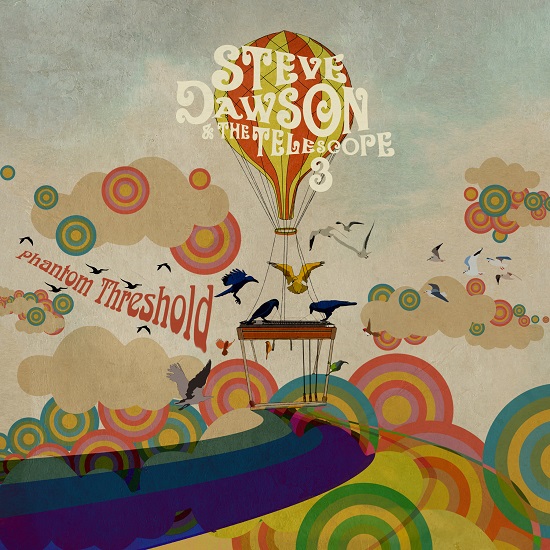
OK, with this one it’s time to share some insights into the way my thoughts and feelings about new music turn into an article on a website. The starting point is that Music Riot doesn’t do negativity; you can get plenty of that anywhere else on the internet. We want to share good live and recorded experiences in the hope that a few music lovers will buy in to them and spread the word. So the first question is, do we like it and there’s only one way to decide that and that’s by listening to it; not once or twice, probably half a dozen times and make some good, old-fashioned, scrawled hand-written notes. At that point, I know whether I want to share it and I’ll probably have a look at the press release for the first time.
By now, you probably want to know what this has to do with ‘Phantom Threshold’. Fair question; after a few listens, it’s obvious that the eleven instrumentals on the album are all soundtracks for movies that haven’t been made and might never be made. The instrumentation (more about that a bit later) and structure of the pieces are cinematic in scope and depth and that’s the starting point for the press release. It’s always nice to know that you’ve tuned in to the artist’s creative vision, however limited your understanding of that vision might be.
Steve Dawson is one of those players in the mould of David Lindley that seems to see every stringed instrument as a challenge to be conquered; he plays a lot of pedal steel on ‘Phantom Threshold’, but there are some standard electric and acoustic guitars as well as resonators, a Weissenborn and a Marxophone. Yeah, I had to search it online as well – it’s a fretless zither and you probably remember the zither from the soundtrack of ‘The Third Man’. And we’re back into movie instrumentation territory again.
You might ask why a guitar player and producer would want to create an album full of mood instrumentals, but that’s missing the point; when you’re a player and writer as gifted as Steve Dawson, why wouldn’t you do it? And with his previous record, you know it’s going to be worth listening to.
‘Phantom Threshold’ is packed with innovative arrangements and classy but unfussy playing. The stylings range from solo pieces such as the album’s Weissenborn closer ‘Whirlwind’ and the pedal steel solo interlude ‘Burnt End’ to full-on band arrangements with layers of guitars and keyboards on most of the rest of the album. On a couple of tracks, including the opener ‘Cozy Corner’, the combination of organ and slide guitar hint at Pink Floyd’s ‘Wish You Were Here’ era. While most of the titles hint at scenes, there are a couple that are more literal; ‘Tripledream’ is a piece in three sections, one of which is based around a New Orleans jazz styling, while ‘That’s How it Goes in the Relax Lounge’ starts with a lounge music feel before dipping into some Latin rhythms.
The complex arrangements on the full band pieces are even more impressive when you know that the musicians recorded their contributions remotely. Quite a feat of arrangement and stitching together, particularly when the opening track, for example, features seven different keyboard instruments on top of Steve’s guitars and the rhythm section. And clever is all very well, but Steve Dawson has created an album that you will want to listen to; you want to know what each new track is going to bring. There are so many different styles and textures that ‘Phantom Threshold’ never becomes predictable as it rattles off references to dozens of musical genres and sub-genres using most of the popular music instruments you’ve ever heard of and a few that you probably haven’t. It’s an album that musicians will love, but there’s something here for everyone and you’ll get something new from every listen.
‘Phantom Threshold’ is released on Friday August 12th on Black Hen Music (BHCD0097).
Here’s Steve playing live over the ‘Twig Bucket’ backing track:
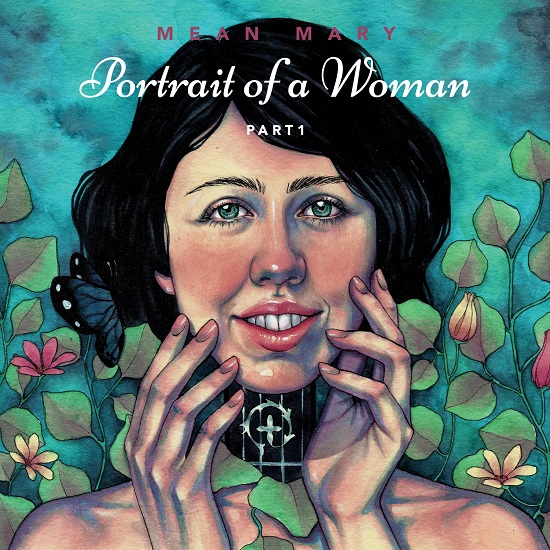
Mean Mary, or Mary James if you like, is a whole bunch of interesting characters. There’s Mary James the multi-instrumentalist (with banjo at the forefront), Mary James the singer-songwriter and Mary James the author, just for a start. She’s also the sister of gifted twelve-string guitar player Frank James and daughter of author and songwriter Jean James. All of these facets of Mary James are pulled together in ‘Portrait of a Woman (Part 1)’, which should be followed by Part 2 in September 2023. The first part highlights Mary’s many talents, featuring banjo and violin instrumentals (‘Merry Eyes and ‘Butterfly Sky’), songs that tell stories, songs of life as a touring musician and a few songs that hint at some kind of supernatural menace. It’s a pretty comprehensive package.
The album opens with a powerful display of Mary’s strengths; it’s a full band piece featuring Mary’s vocals, guitar and banjo, Frank’s twelve-string and vocals and it’s a co-write with Mary’s mum. ‘Cranberry Gown’ is a story song set in a traditional folk styling, telling a tale of one important symbol that can make a world of difference to a life of drudgery. The song is circular; the gown is lost and then found again, and self-esteem is restored. The album’s second song ‘Bridge Out’ is a humorous take on life on the road, bringing out the interaction that characterises Mary and Frank’s live performances, with Frank cast as the gloomy, unrecognised sideman. It’s a bit of fun underpinned by some serious observations about the pressures of life as a touring musician.
The touring musician theme reappears on ‘Big Tour Bus’ , featured on Mary’s 2020 album, ‘Alone’, which takes a more serious look at the pressures on travelling musicians from a female point of view. If you’ve heard solo female musicians talk or sing about life on the road, you’ll recognise the story Mary tells. It’s not just difficult, it can be dangerous out there.
Of the remaining songs, there are a few personal standouts. ‘Bette Come Back’ is a real story-teller’s song, building up a brooding intensity about the whereabouts of Bette, who has disappeared during a storm. The turnaround is that Bette is a cat frightened by the thunder who has hidden under the bed. The traditional, folky, ‘Old Banjo’ is on the same theme as ‘Cranberry Gown’; everything will be all right as long as the banjo is there. ‘Only Time to Pray’ conveys a sense of menace from the bowed upright bass notes of the intro, while the album’s closing song ‘Clouds Roll By’ displays Mary’s vocal range in a love and escape song that gently evokes The Band.
This album gives a good idea of the breadth of Mary’s talents, from the breath-taking banjo playing, through the vocal versatility to the quality of the songs she creates on her own and with her mother Jean. Give it a listen and try to catch her live if you can.
‘Portrait of A Woman (Part 1)’ is out now on Woodrock Records (WDRK-4303).
Here’s the video for ‘Cranberry Gown’:
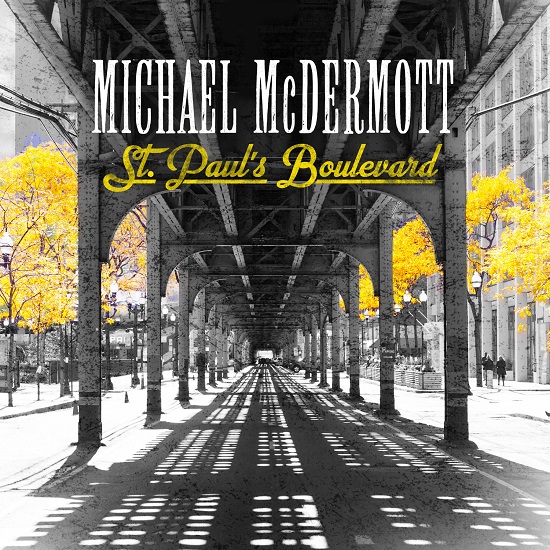
Michael McDermott isn’t making life easy – every year he releases an album (sometimes even two) that grabs your attention immediately with quality of the songwriting, the quality of the playing and arrangements, and the sheer variety of influences from the classic American pop/rock songbook. The difficulty lies in trying to think of something new to say about this steady sequence of excellence. There are some easy comparisons to make, but when all of those have already been made, it’s a challenge to know where to go next. I guess it’s safe to say that ‘St Paul’s Boulevard’ is a continuation of the winning sequence; it’s a classic album that would be huge if we still had a significant market for albums.
There’s a narrative running through Michael’s work since The Westies ‘Six on the Out’ of degradation, recovery and redemption. ‘St Paul’s Boulevard’ feels like a postscript to that narrative, looking back to the lowest of times with clear-eyed detachment and looking forward to the future with technicolour optimism. As you would expect from a Michael McDermott album, ‘St Paul’s Boulevard’ is packed with historical, geographical, mythological, literary, biblical and popular culture references, particularly ‘Marlowe’ which is a nod in the direction of Deacon Blue’s ‘Real Gone Kid’ and a tribute to Raymond Chandler’s sleuth Philip Marlowe.
The arrangement of title song is a slow builder; the ambient intro with slide and piano gradually fills out into a full band sound as the various characters in the story make their brief appearance. The Boulevard is that place we have in our history that’s full of possibility for triumph or tragedy; the place where we met characters that would have positive and negative impacts on our lives. There are a few references to heroes on the album and the most telling is probably in this song: “None of the heroes around here have capes, they’re just talking in taverns and on fire escapes”.
Michael McDermott isn’t afraid of throwing in musical or lyrical references; ‘Where the Light Gets In” has a hint of Coldplay’s ‘Higher Power” and the obvious Leonard Cohen reference, while there’s plenty of chiming guitar in Byrds/Tom Petty/Flaming Groovies style. While we’re on the subject of guitars, a true master of the fretted stringed instrument plays on the album and any project featuring Will Kimbrough is going to be good; he plays guitar, mandolin and banjo across the album.
‘St Paul’s Boulevard’ is another powerful Michael McDermott album that blends musical references from folk, soul, country, rock and other areas to produce an album that looks back to difficult times but also looks forward with optimism (“Peace, lave and brilliant colours to you all”). It’s a celebration of this moment and the moments to come.
‘St Paul’s Boulevard’ is out now on Pauper Sky Records (PSR010).
Here’s the video for the album’s final track, ‘Paris’:
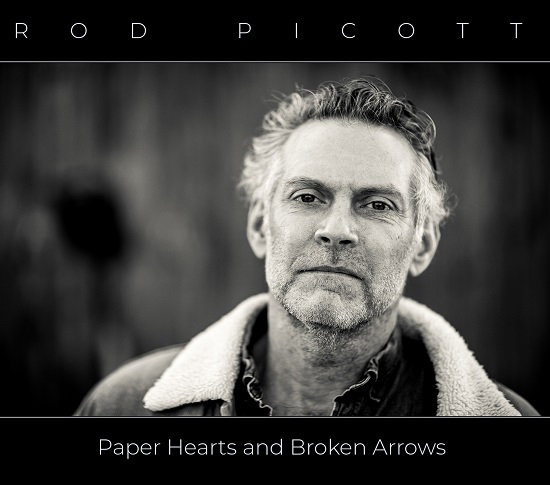
Every so often, an album comes along that isn’t just a great collection of songs played beautifully; an album that pushes a few personal buttons and maybe touches a few raw nerves as well. Rod Picott’s ‘Paper Hearts and Broken Arrows’ is one of those albums that creates a very personal connection. Maybe it’s an East Coast thing between Maine in the USA and Fife in Scotland; you don’t need to look too hard to see the parallels and ‘Washington County’ paints a picture of an area where genteel resorts sit side by side with poverty-stricken former industrial towns and villages. They’re three thousand miles apart, but it’s the same experience.
Just taking a step to one side for a moment, as music has moved into the digital realm, so have some of the ways of getting it out there and letting people know about it. It’s not so long since review copies arrived as CDs (or vinyl if you want go back a bit further) with an A4 press release, through the letterbox. Now they arrive in your inbox and an artist or PR team can include much more material with no extra distribution costs. Which means that artwork and credits, additional photos and lyric sheets are fairly common now and there’s a relatively recent addition of the artist’s ‘track-by-track’ notes. Reviewers should rely more on their ears and instincts than press releases, but you can sometimes pick up a useful insight into the artist’s vision. In the case of Rod Picott, there’s always something worth reading when he puts fingers to keyboard.
The story behind ‘Valentine’s Day’ on this album is a perfect example. It’s a very honest song, painfully so, that’s stripped back to the raw basics of acoustic guitar and cracked vocal. Rod’s notes tell us that the original recording was a full band version that sounded “wonderful – and completely wrong”, like “an Eagles track with a guy that can’t really sing”; the arrangement was too perfect and in Rod’s words again, “for me, perfect is almost always wrong”. Producer Neilson Hubbard liked the stripped-back version and three takes later it was in the can.
There are a couple of strands that run through the album, Rod’s acceptance of a spell of single life that surfaces in the opening song ‘Lover’, ‘Valentine’s Day’ and ‘Mona Lisa’ where the loneliness exists for creatives even inside a relationship, and the autobiographical songs ‘Lost in the South’ and ‘Mark of Your Father’ which both reference his background and his father with ‘Lost in the South’ using his father as a jumping-off point for Rod’s early experiences in the South, while ‘Mark of Your Father’ explores the complicated nature of father-son relationships using Marvin Gaye as an example of how bad things can really get.
And then there are a few songs taking their inspiration from other areas. The dark and menacing ‘Revenuer’, with its dirty guitars and screaming slide solo is inspired by a Taylor Brown novel and explores that thin line between right and wrong when your choices are limited and times are hard. ‘Frankie Lee’ is an outlaw song where the main character always accepts his ultimate fate as the electric chair and, like a lot of Rod’s more stark songs, wouldn’t sound out of place on The Boss’s ‘Nebraska’ (and I know I’ve made that link before).
Rod’s a fan of boxing and ‘Sonny Liston’ is a song that pulls at some of the threads running through a lot of Rod’s work. Sonny Liston was a complex character, torn between the world he came from and the dubious world of professional boxing and gangland connections that he joined without ever gaining the respect of either. The man who took his world title, Cassius Clay/Muhammad Ali is better remembered now, but the Sonny Liston story is full of loose ends, links to organised crime, drugs, sudden death and astonishing sporting prowess. Rod weaves all of these strands into a powerful and economic narrative with a simple alliterative and assonant chorus: “Two big fists pumping like pistons, nobody punched like Sonny Liston”.
Fourteen albums in, Rod Picott is still pushing at the boundaries of his craft, still looking for ways to create songs that mean something, to him and to his audience. Let’s not use the word ”perfect” to describe ‘Paper Heart and Broken Arrows”; let’s go with an outstanding collection of beautifully-crafted songs delivered by outstanding musicians and a singer whose voice cracks with power and emotion. OK with you?
‘Paper Hearts and Broken Arrows’ is released in the UK on Friday June 10on Welding Rod Records.
No videos yet for songs on the album, but here’s a link to a live performance of the fabulous ‘Rust Belt Fields’:
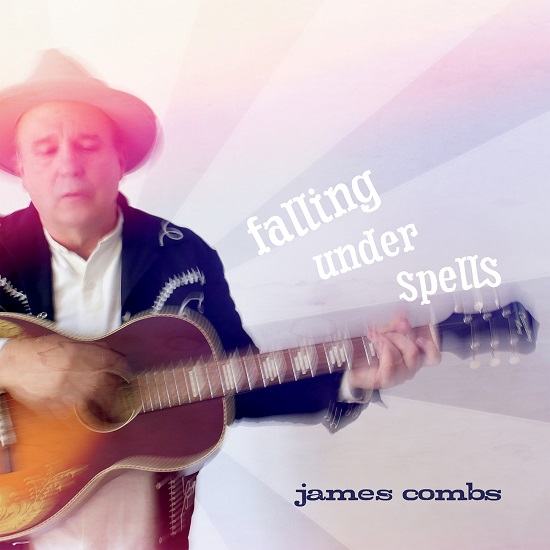
It looks like it may be some time before we escape the influence of the pandemic on recorded music, particularly in the areas of Americana and folk where the traditions of storytelling and reflecting the world around us are important. ‘Falling Under Spells’ isn’t crammed with references to COVID, but it’s certainly the basis for the album’s two closing songs, ‘Everybody Inside’ and ‘Nowhere Fast’, while the problems of twenty-first century America, including its forty-fifth President, are also themes that permeate the album, along with a few magical and mystical references.
The album’s opening song ‘Ruleless Games’ attempts to explain the unfairness of the world to a child and features some of the album’s sound signatures, the muted trumpet sound and the plaintive, higher register, Neil Young-like vocal of James Combs that’s echoed by the Crazy Horse feel of some of the arrangements. The horns are gentle and muted, not the strident stabs that are used to punctuate our soul classics; they’re more mariachi than Motown or Stax and contribute to the mellow feel of the album.
There are a few more nods in obvious and less obvious directions to other musical styles on the album. ‘Spells’ hints at The Byrds with some sixties tremolo guitar and maybe even a touch of The Stones’ ‘The Last Time’ (with added trumpet); all elements that you might have heard in referenced in the Americana canon. ‘Cut and Run’ is slightly different in that the reggae-tinged arrangement has more than a hint of the Gorillaz song ‘Clint Eastwood’ with piano and slide guitar. The title repeats like a mantra through the song as it urges us to abandon America’s twisted priorities (and their hype-man).
Despite the ominous and mystical feel of songs like ‘Strange Signs’ and ‘Spells’, ‘Falling Under Spells’, manages to generate a gentle wave of optimism for the future with songs like ‘True Believer’ and ‘Joy is Allowed’, a reminder that even in the most awful times, it’s ok to find joy somewhere. And any album that’s underpinned by the gentler side od Neil Young is fine by me.
‘Falling Under Spells’ is released in the UK on Friday May 27th on High Pine Steeple Recordings (1001).
Here’s a link to the video for ‘Strange Signs’ (featuring April Mann):
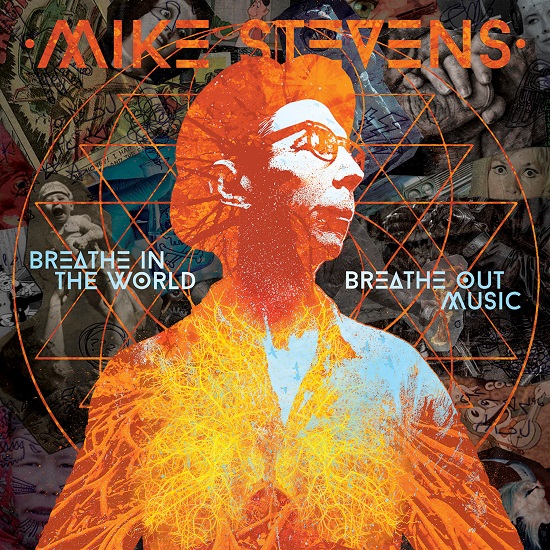
‘Breathe In the World, Breathe Out Music’ is one of those albums where, at first listen, you genuinely have no idea what’s coming next; more about that shortly, but some background first. Mike Stevens is a hugely respected harmonica virtuoso who has played the Grand Ole Opry over 300 times and has experimented widely with his playing techniques to create a unique style. He’s also recovering after a diagnosis of Lyme disease which left him virtually unable to play. It’s the kind of situation that can make you re-evaluate and hit the reset button, which is exactly what Mike has done with this album; he’s playing by feel rather than by experience and practice.
The album’s opening song, and the lead single, gives no clues about what’s coming up on the rest of the album. It’s, well, it’s jaunty; it’s played as an upbeat and offbeat reggae tune with a really positive message, a shiny, polished Polly Harris vocal and even a choir of children coming in at the end. It’s really uplifting but doesn’t even hint at what’s coming up. You have to expect the unexpected and the version of Gordon Lightfoot’s ‘The Wreck of the Edmund Fitzgerald’ is a perfect example.
The 1976 original is in the style of a folk ballad told in seven lengthy verses and it’s all about the story. It’s been covered before, in a pretty leaden version, by the Dandy Warhols, but Mike’s interpretation is very different; it’s an instrumental where the arrangement follows the narrative flow of Gordon Lightfoot’s original. The song starts peacefully with the violining guitar part evoking seagull cries and builds steadily towards the clamour of the fatal storm before the closing calm of remembrance of the dead sailors. It works as a stand-alone piece, but it’s even better if you know the original song. Another example of the unexpected is ‘Amazing Grace’, which opens in a Hendrix Star-Spangled Banner’ style before calming down into a more peaceful version of the hymn. It’s stunning harp playing, technically and creatively.
And you could write endlessly about the creativity that runs like a pulse through the album. ‘Orange Blossom Special’ paints an aural picture with harp and guitar of a train pulling out of the station and building up to cruising speed while the closing track, ‘Put Your Phone Down’, is a freeform harmonica improvisation punctuated by short, almost random, spoken lines exhorting us to celebrate life without the filters of technology. And those are just my personal highlights.
‘Breathe In the World, Breathe Out Music’ is a stunningly creative and innovative album with a surprise around every corner; you think you’ve heard everything the album has to offer, then in comes the zither on the cinematic ‘Jesse’s Request’. This is a genuinely original album.
‘Breathe In the World, Breathe Out Music’ is released on May 20th on Stony Plain Records (SPCD1452).
Here’s a link to the video for ‘Livin’ in Sarnia’, featuring Cory James Mitchell:
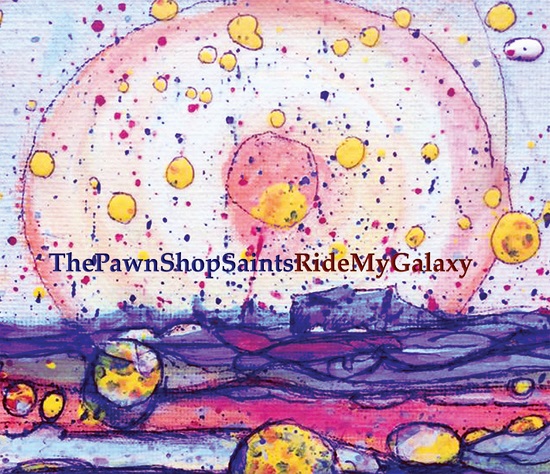
‘Ride My Galaxy’ looks like it will be one of three Pawn Shop Saints/Jeb Barry albums conceived in the pandemic to be released in the near future. The thing that unifies this album and will probably unify the remaining two albums is Jeb Barry’s voice. The songs range from the nostalgic West Coast country/rock of ‘Chevy Nova’ to the unrelenting gloom of ‘Ain’t No Mama Here’, but the cracked emotion of the voice that combines the vulnerability of Jackson Browne with the raw power of Greg Dulli is a constant.
There are the trademark Pawn Shop Saints acoustic staples aplenty on the album, but there are also a few elements of pop and rock pushing through the mix. There’s an opening studio chat on ‘Exits’ about getting the song down “mistakes and all” that sets the tone for the album. It’s much more about capturing the feel of the songs, rather than perfect performances. There’s no shortage of nods in the direction of iconic pop and rock figures and songs either. The I-VI chords at the start of ‘diane’ have a hint of Sam Cooke’s ‘Cupid’, while ‘Jenny Why’ has a hint of Danny Whitten’s ‘I Don’t Want to Talk About It’ and an arrangement that’s reminiscent of The Band. The paranoid menace of ‘Wicked’ is emphasised by a band sound that could be Crazy Horse at its most rough and ready. You get the picture; you can pick out the influences, while it’s all held together by great songwriting and Jeb Barry’s voice.
The album opens with a song that isn’t in typical Pawn Shop Saints territory; ‘Chevy Nova’ is unashamed seventies nostalgia. It’s a cars, girls, booze and drugs song, but in an innocent and naïve way. The closing song is firmly back in Pawn Shop Saints lyrical territory with a story of the pain caused by a broken relationship, but with a grungier sound that’s emphasised by a completely live studio recording.
‘Ride My Galaxy’ is an intriguing blend of the hard-edged dirt-poor Americana typified by the floods, crop failures and fever deaths of ’Ain’t No Mama Here’ and some new elements pop, punk, psychedelia and even nostalgia. It’s a good mix and creates a fascinating album.
‘Ride My Galaxy’ is out now Dollyrocker Records (DR20221). Here’s the video for ‘Exits’:
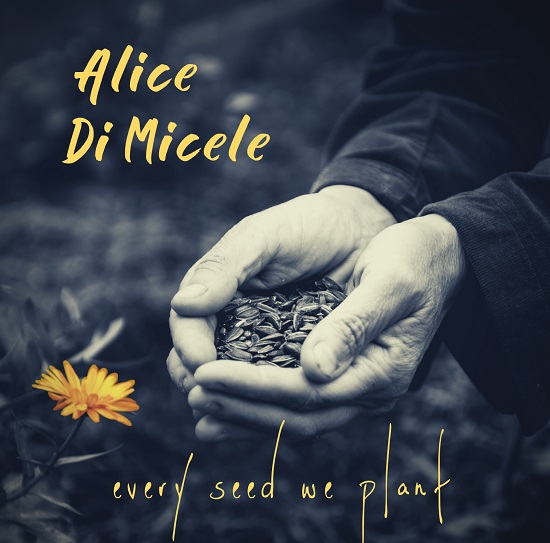
Three decades in the business and fifteen albums is quite an impressive achievement. ‘Every Seed We Plant’ is the next step; album sixteen. The good news is that Alice’s creativity is undimmed after that time and her voice is still as powerful as ever over the whole of its wide range. The album displays a wide range of styles from the slow country waltz feel of ‘Sweet Elaine’ to the soulful rock of the album’s opener ‘For Granted’. The styles may vary but there are several themes related to the last two years running through the album that create a sense of unity across the piece. Apart from the obvious references to grief, there’s anger, redemption, joy and a sense of rebirth. The album’s opening and closing songs both have references to planting and nurturing.
The two songs that best demonstrate the emotional range of the album are ‘Dispatch’ and ‘Sweet Elaine’. ‘Dispatch’ is a very angry song about the real events that led to the killing of a black retired Marine, Kenneth Chamberlain, in his home in White Plains, New York. The story’s told from the point of view of the dispatcher responsible for sending the police to activations of LifeAid medical alarms, who was called by Chamberlain asking the police to withdraw. It’s a very angry song about something that’s still way too common in America today, told in a very compelling way. ‘Sweet Elaine’ is a slow country-rock waltz telling the beautiful story of a woman and a dog who profoundly change each other’s lives. The slight vibrato on the vocal and the Eagles-style vocal harmonies create a happy and relaxed feel that perfectly matches the positive narrative.
The album opens with ‘For Granted’, a soulful rock groove in a seventies style that evokes Maggie Bell or even an in-tune version of Janis Joplin. It nods in the direction of Etta James’s ‘I’d Rather Go Blind’ (the unnecessary cover of choice for many a second-rate blues-rock band) with a rock band line-up including organ and piano (with the obligatory triplets of course). Alice’s voice is so versatile that there are comparisons to be made with Joni Mitchell, Rickie Lee Jones and many others. The band arrangements are equally diverse, with ‘Jersey’, not surprisingly, having a hint of the E Street Band as it takes a hammer to the New Jersey stereotypes that Alice has probably heard for most of her life.
As a whole, the album takes a journey through the various stages of recovery from the pandemic and its associated woes from grief to rebirth, with the final two songs, ‘Sweet Elaine’ and ‘’Every Seed’ looking forward to a more hopeful future. It’s a lovely example of creating beautiful art from unpromising raw materials.
‘Every Seed We Plant’ is out now in the UK on Alice Otter Music (AO116).
Here’s the video for the title song:
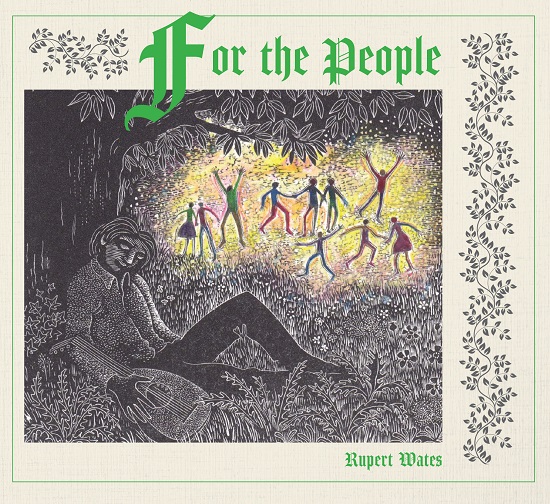
There’s a play on words in the title of this album; you can exchange the word “people” for “folk” and the literal meaning doesn’t change, but some new layers are added. Rupert Wates recognises this in a press release quote where he describes folk music as: “music of the people, by the people, for the people”. The album is a return to Rupert’s English folk roots, a celebration of his supporters and a celebration of the themes and traditional tales that run through the history of the genre. The celebration takes the form of a set of songs created in the folk idiom, using familiar themes and delivered with acoustic guitar backing and very little else apart from a bit of fiddle and some additional vocals.
The stripped-back delivery affects the structure of the songs as well. The guitar playing, accomplished as it is, isn’t there to bedazzle; it’s there to underpin and counterpoint the melody and enhance the message of the song. Without guitar solos or instrumental breaks, there’s room for the lyrics to take as long as it needs to get to the end of the story, while including traditional elements such as line repetition and call and response.
There’s a feeling that the album isn’t so much about the individual songs, but more about using the building blocks of the genre (the powerful narratives, the murder ballads, smuggling, stories of war and the mythical to create authentic but completely new songs in the folk idiom. This project in other hands could have become a pastiche, but Rupert Wates is much too good a writer and performer for that. He expertly marries intricate guitar parts to beguiling melodies to create a fascinating collection of songs that pays tribute to his folk roots.
The album’s ten songs (twelve if you split the two medleys into their component songs) are all well-crafted pieces of work but you can pick out two or three to represent the overall feel of the album. The high register picking on the ‘All the Fair Ladies’ leads into a wooing song with an additional call and response female vocal. After a short instrumental bridge, it’s straight into another call and response song on the theme of the spurned lover with some additional vocal harmonies. ‘Oh Captain’ is the mythological song of the bunch telling the story of a captured mermaid despite to return to her family, while ‘The North Road’ is a murder ballad relentlessly pushed on by a relentless fast finger-picked rhythm as it tells the story of the murder of a drummer boy and its inevitable outcome.
‘For the People’ is a neat celebration of the Engish folk style, created by a singer-songwriter with a huge knowledge of that genre. Rupert Wates is a master of his craft and he’s produced a lovely tribute to the genre and his fans.
‘For the People’ is out now on Bite Music (BR12116).


